Australian share market surprise drop after Wall Street rebound
Australia’s share market has fallen again despite expectations it would rise after Wall Street closed higher following a rollercoaster trading day, as the coronavirus outbreak wipes off thousands of dollars from superannuation balances.
News
Don't miss out on the headlines from News. Followed categories will be added to My News.
Investors have switched into share selling mode again, sending Australia’s volatile share market lower despite a rally on Wall Street overnight.
The benchmark S&P/ASX200 index was down 26.2 points, or 0.44 per cent, at 5,913.4 points at 1015 AEDT on Wednesday with only the energy, health care and info tech sectors in the green.
Futures had pointed to a rally on Wednesday but after 15 minutes of trading, and a few profit warnings, the broader All Ordinaries index was down 20.2 points, or 0.34 per cent, at 5975.6.
The US S&P500 rose a huge 4.7 per cent overnight as coronavirus fears were eased by government promises to fiscally assist economies.
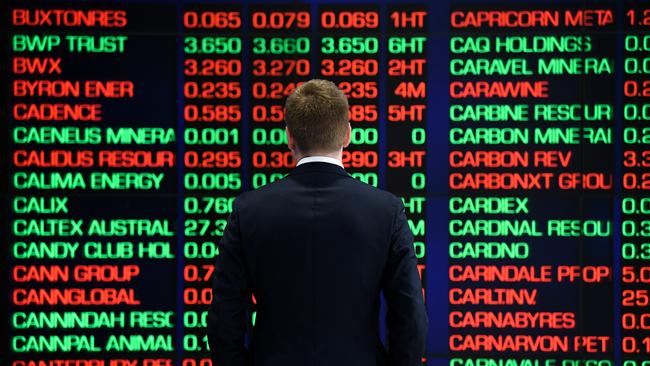
Oil prices also rallied overnight on stimulus hopes, and as parts of Hubei province, which was the epicentre of the coronavirus outbreak, start to return to normal.
But a rise in energy stocks and healthcare on the ASX on Wednesday couldn’t outweigh falls in the big banks, gold stocks, supermarket giants and materials companies.
The Australian dollar was buying 65 US cents at 1015 AEDT, down from 65.62 US cents at the market close on Tuesday.
MORE NEWS:
‘You’re full of s…!’: Biden in heated clash with gun owner
Network Ten boss Paul Anderson quits
Furious Charlie Sheen denies ‘sick, twisted’ rape claims
Kate’s Italian nightmare amid virus lockdown
The ASX yesterday staged a dramatic recovery. Shortly before 1pm, the ASX 200 was up 1.8 per cent — marking a swing from its morning trough of 5.8 per cent.
Meanwhile, superannuation balances have taken a hit over the last fortnight.
The coronavirus outbreak has reportedly wiped off $5900 from the average superannuation balance, according to data prepared by analysts Morningstar for The Guardian.
‘TOO EARLY’ TO GUESS VIRUS HIT PAST MARCH
The Reserve Bank is reluctant to speculate how deeply the coronavirus will hurt Australia’s growth beyond the March quarter, but suggests interest rate cuts and mining investment will at least help cushion the blow.
Deputy Governor Guy Debelle on Wednesday said a record low interest rate would support a post-virus recovery in spending even if Aussie households were reluctant to part with their cash as the virus spreads.
“They may not spend it straight away, but it brings forward the day when they will be comfortable with their balance sheets and resume a normal pattern of spending,” Mr Debelle told the Australian Financial Review Business Summit in Sydney.
The bank cut the cash rate to a record low 0.5 per cent on March 3 to help buttress the economy against the impact of the coronavirus outbreak and is widely expected to make it back-to-back cuts next month.
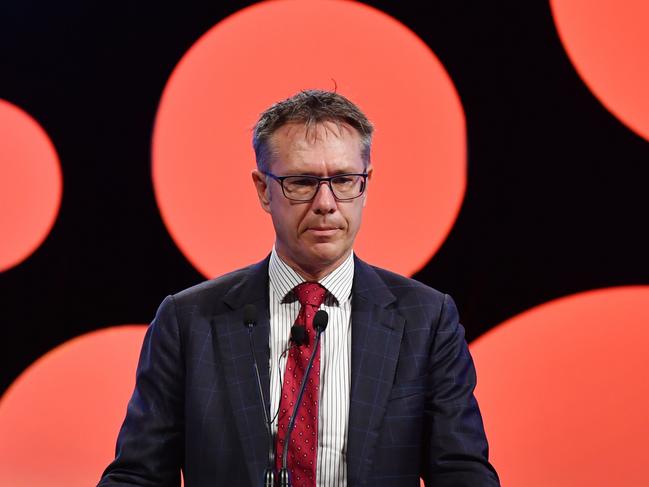
That would take the interest rate to a new record low 0.25 per cent and pave the way for alternative policy measures such as quantitative easing. The RBA’s second-in-command was expected to talk about investment at the Sydney conference on Wednesday.
Instead Mr Debelle gave the bank’s view of the local and global economy as the virus spreads to more countries.
Mr Debelle reiterated that the central bank expected the virus will deliver a 0.5 per cent hit to GDP via the education and tourism sectors alone in the three months to March, but the rapidly evolving nature of the outbreak meant a mid- term outlook was hard to quantify.
“Clearly we are still only in the early weeks of March, so the picture can change from here,” he said.
“It is just too uncertain to assess the impact of the virus beyond the March quarter.”
Mr Debelle said the bank’s business liaison program was gathering information on supply-chain disruptions to the local construction and retail sectors, but the picture remained unclear.
WALL STREET’S ROLLERCOASTER RIDE AFTER BLACK MONDAY COLLAPSE
Stocks on Tuesday recouped most of their historic losses from the prior day as hopes rose, faded and then bloomed again on Wall Street that the US government will try to cushion the economic pain from the coronavirus.
The day’s moves were a microcosm of the severe swings that have dominated recent weeks, and market watchers say they’re likely to continue until the number of infections stops accelerating. In the meantime, investors want to see a big, coordinated response from governments and central banks to shore up the virus- weakened economy.
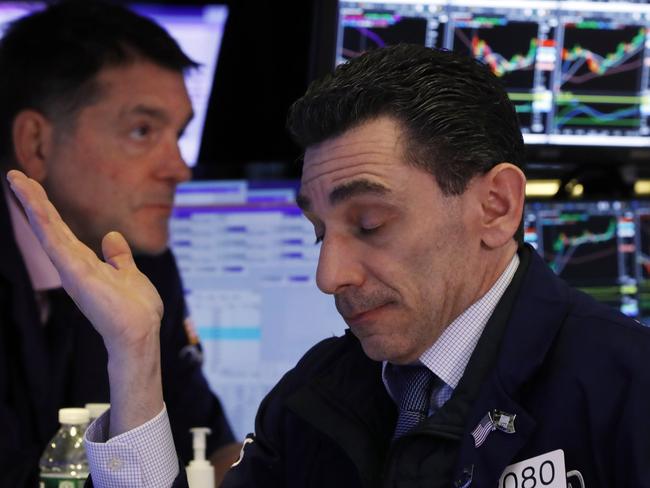
The S & P 500 surged as much as 3.7 per cent in the morning, only to see the gains evaporate by midday. The index then bounced up and down before turning decisively higher after President Donald Trump pitched his ideas for a break on payroll taxes and other economic relief to Senate Republicans. By the end of trading, the S & P 500 was up 4.9 per cent and had erased three-fifths of Monday’s loss.
The volatility reflected the mood of a market just as preoccupied with the virus as the rest of the world. Since US stocks set their record high just a few weeks ago, traders have crossed over from dismissing the economic pain created by COVID-19 - thinking it’s similar to the flu and could stay mostly contained in China - to being in thrall to it - worrying that it may cause a worldwide recession.
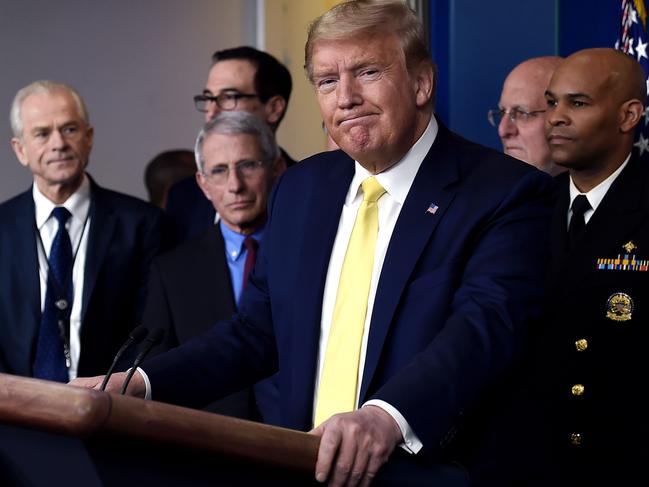
While they won’t cure illnesses or get quarantined workers back into factories, spending and stimulus programs would put cash into the hands of households and businesses while health experts try to corral the virus. That could stave off or at least moderate a possible recession.
Investors saw glimmers of a coordinated response, which led to Tuesday’s optimism.
At a White House press briefing on Monday night, Trump said his administration would be asking Congress to cut payroll taxes and pass other quick measures aimed at easing the impact of the coronavirus on workers.
In Japan, a task force set up by the prime minister approved a 430 billion yen ($A6.3 billion) package Tuesday with support for small to medium-sized businesses.
But as markets waited on Tuesday for details about Trump’s plan, prices oscillated sharply.
After a meeting with major health insurers, Trump said the government is working with the cruise line industry, one of the hardest hit by the virus.
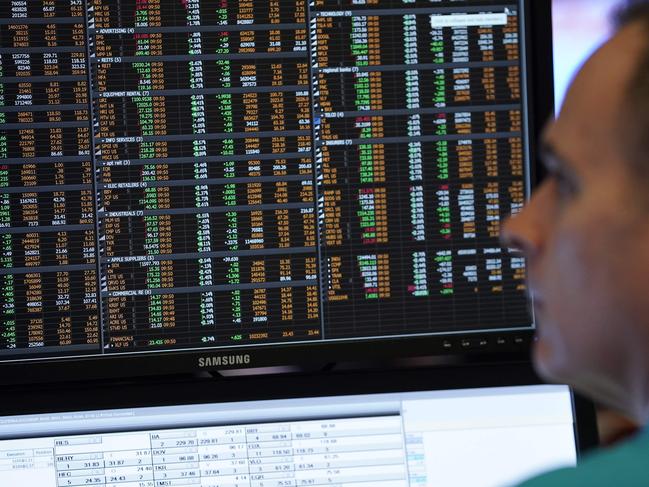
That helped lift the market, which had earlier flipped to losses amid doubts that the government would announce anything soon.
“We are working very closely with the cruise line industry, and … taking strong steps in terms of people going on and going off. But they are spending a lot of money and they are working very hard, and we’re going to be helping that industry,” Trump said.
“Likewise with the airline industry. They’re taking very, very strong steps for people coming into our country, even getting off the planes. So we are working very closely with them, we’re helping them. They’re two great industries and we’ll be helping them through this patch, and so far I think it’s been going very well.”
Monday’s 7.6 per cent plunge for US stocks was the sharpest since 2008, when global authorities banded together to rescue the economy from the financial crisis.
